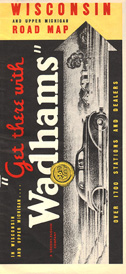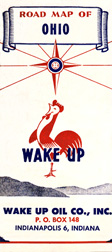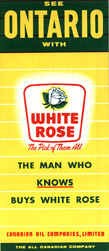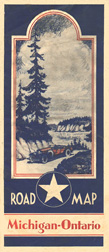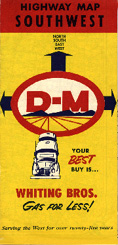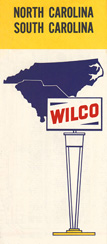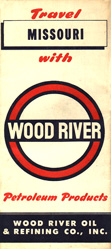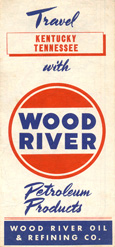Oil company maps – North America – W
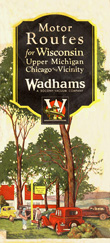
Wadhams Oil Corporation was a Wisconsin-based manufacturer and marketer that was purchased by Vacuum Oil in 1930. The following year, Vacuum merged with the Standard Oil Company of New York (Socony) to form Socony-Vacuum. This map was issued in 1933.
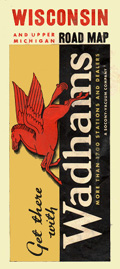
Vacuum's well-known Mobilgas brand was phased in through Wadhams territory as it was elsewhere. Mobilgas was to gradually replace the Wadhams name by the beginning of World War II. This colorful map was issued in 1936.
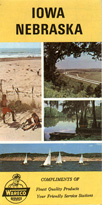
The Wareco brand was first used during the Thirties by central Illinois-based Ware Oil. The company operated discount service stations in Illinois and a couple surrounding states. The company still exists today, retaining the uniformed attendant logo pictured in this map. This map was issued in 1967 and uses the SIGMA (Society of Independent Gasoline Marketers of America) standard design with Wareco's logo overprinted on the front cover.
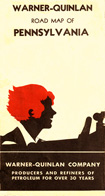
Founded in New York City during the nineteenth century, Warner-Quinlan marketed in New York and New England. This map was issued in 1931, two years before the company was acquired by Cities Service, with the Cities Service brand being phased in during the late Thirties.
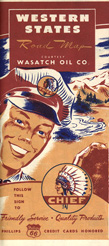
The Wasatch Oil Company marketed in Utah and the northwest and branded stations with a variety of names, the most prevalent being "Chief". This map was issued in 1948, just after the company's acquisition by Phillips. Shortly thereafter, former Wasatch stations were rebranded to the Phillips 66 name.
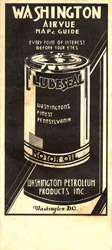
Little is known about Washington Petroleum Products, which was based in the nation's capital. This map is dated 1939.
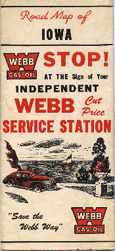
Webb was a regional brand based in Duluth, Minnesota. The company operated stations in Minnesota, Michigan, and Wisconsin.
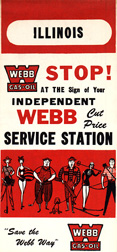
This Webb map was issued in 1955. Webb continued to market in a few upper midwest states until acquisition by Spur in the early Seventies.
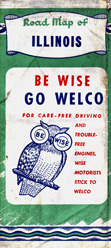
Welco was the brand name used by the Wells Oil Company of Chicago. This map, using a generic Rand McNally cover, was issued in 1952.
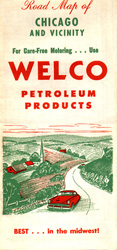
Wells Oil Company of Chicago operated a chain of discount stations in the upper midwest until the energy crisis of the mid-Seventies. This map used a generic Rand McNally cover and was issued in 1959.
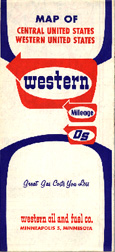
This 1964 map issued by Minneapolis-based Western Oil and Fuel shows the firm's Mileage and DS brands along with the recently-introduced Western brand used for the company's convenience store chain.
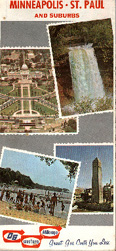
This 1967 map triple-branded map shows the DS, Mileage, and Western logos operated by Western Oil and Fuel Co. By this time, Western was a subsidiary of the Continental Oil Co. (Conoco).
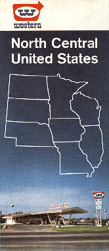
This 1970 map was issued by the Western Oil and Fuel division of Conoco. The fact that it shows only the Western brand reflects a change from previous maps issued by the Minneapolis-based subsidiary. By this time, the company's DS and Mileage brands had been converted to Conoco branding, but the distinctive Western chain of convenience stores retained their traditional branding for a time.
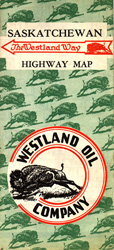
Westland Oil Company was a n independent refiner and marketer established in Minot, North Dakota during the Twenties. This attractive map was issued in 1938.
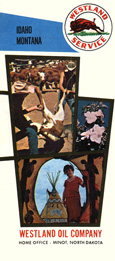
Westland marketed in the northern plains states, based from headquarters in Minot, ND. This Westland map was issued in 1968.
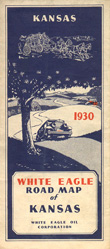
White Eagle was a Kansas City-based producer that marketed in an 11-state area. The company was purchased by the Standard Oil Company of New York (Socony) in 1930, after which time the Mobilgas brand became more prominent. The White Eagle name was relegated to the name of the corporate subsidiary before eventually being phased out completely. This 1930 map dates from the time around White Eagle's acquisition,` and has an appearance similar to that of maps issued by Socony's other affiliates during this time period.
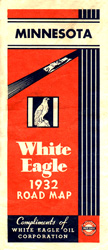
This attractive 1932 map features the White Eagle name and the eagle that was part of the company's brand identification.
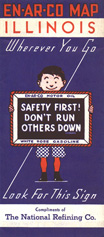
The National Refining Company was founded in 1882 and was a large refiner/marketer operating through the midwest and eastern states. A subsidiary marketed in parts of eastern Canada. The company's famous "boy and slate" logo is prominent in this map from the late Thirties, but was later de-emphasized.
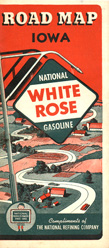
This White Rose map was issued by the National Refining Company in 1941. The Canadian White Rose operation remained until its acquisition by Shell Canada in 1964.
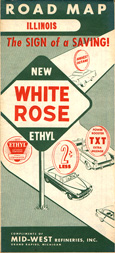
Issued by the Mid-West Refineries, Inc. of Grand Rapids, Michigan in 1955, this map is one of the final U. S. issues using the White Rose brand. The remainder of National Refining Company's United States operations were purchased by Mid-West after World War II. In turn, Mid-West was acquired by Leonard Refining in 1955.
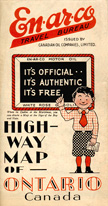
This 1935 map features the famous "boy and slate" logo used by National Refining Company in both the United States and Canada. During the Thirties, National Refining spun off its Canadian operations.
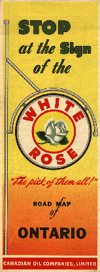
After the former National Refining operations in Canada were separated from the U. S. operations, the Canadian firm phased out the "boy and slate" logo in favor of emphasis on the White Rose name. As it turned out, the United States chain was also to take this same step.
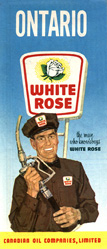
This 1961-issue map features the last map design used by Canadian Oil Companies, Ltd. before that company was acquired by Shell Canada in 1962.
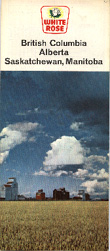
Following the acquisition of Canadian Oil Companies, Ltd. by Shell Canada in 1962, subsequent White Rose maps used the "picture map" scheme used by Shell during that era. This 1964 map was issued just prior to the rebranding of White Rose stations to the Shell brand.
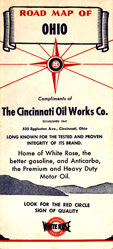
The Cincinnati Oil Works Company was founded in the early Nineteenth century as a lubricants manufacturer. Though the company marketed gas under the White Rose brand, they bore no relation to the National Refining Company also using that brand name. The company was acquired by Tresler Oil, a fellow Cincinnati firm, in 1956.
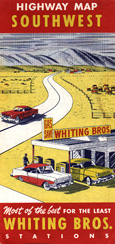
Whiting Brothers was a Phoenix, Arizona-based independent marketer operating in the southwest. This map dates from 1958.
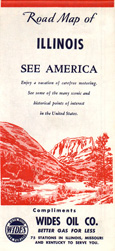
Wides Oil Company was based in Murphysboro, Illinois. This map was issued in 1969. Wides was purchased by Fina during the early Seventies, and all stations were rebranded to the Fina name.
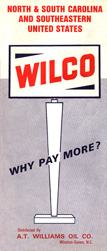
Founded in Winston-Salem, North Carolina in 1963, the A. T. Williams Oil Company is a fairly recent arrival to the scene. Nevertheless, Wilco has been successful at expanding its small chain of gas stations and convenience stores in North Carolina. This map was issued in 1971.
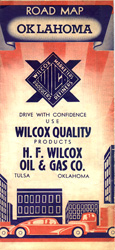
The H. F. Wilcox Oil & Gas Company was a Tulsa-based independent that operated a regional network of stations. This map bears a Midwest Map Co. generic cover but was issued in 1941, following the cartographer's acquisition by H. M. Goushá.
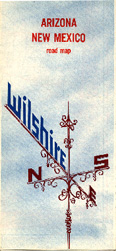
Wilshire was a Los Angeles, California-based refiner/marketer that was purchased by Gulf in the late Fifties with rebranding to the Gulf name taking place in 1965. This map dates from the early Sixties.
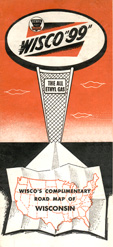
The Wisconsin Independent Oil Company was originally based in Milwaukee and marketed in Wisconsin and other upper midwestern states. This branded map was issued in 1959.
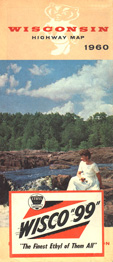
This map is the 1960 Wisconsin state-issued official map bearing a "Wisco 99" sticker. The company was later absorbed by Pure and its Wisco 99 stations rebranded.
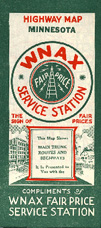
The WNAX "fair price service station" dated from the late Twenties and stands as the only known example of a petroleum retail operation branded with a broadcaster's call sign. Irritated by what he considered high prices at stations operated by the major oil companies, WNAX's owner sought an arrangement wherein the broadcaster supported retailers wanting to participate in the "fair price" operation. Retailers could broadcast advertisements on WNAX at no charge as part of WNAX's participation in the operation. At its peak, several hundred WNAX stations operated through Minnesota, North and South Dakota, Iowa, and Nebraska.
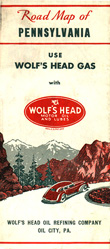
Wolf's Head was a manufacturer of lubricants based in the Oil City area. The company began marketing gasoline in 1928. This map, bearing a Rand McNally generic cover, was issued in 1949. Wolf's Head was aquired by Pennzoil during the early Sixties and the brand name was retained as a secondary brand for some years after the acquisition.
